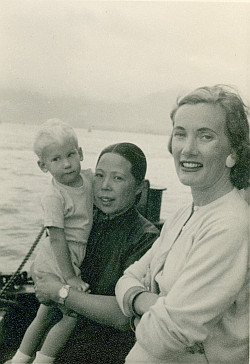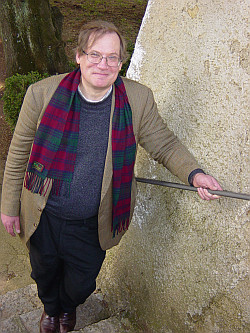Family Background in China (1895 – 1953)
Adam Williams is the fourth generation of his family to be living and working in China. Two sets of maternal great grandparents came to China, from Scotland and England, in the 1890s.
The one was a medical missionary who established his practise in a small village near Changchun in Manchuria. Dr David Dickson Muir very narrowly escaped with his life when Boxers attacked his Mission in 1900. His experiences inspired Adam’s first novel, ‘The Palace of Heavenly Pleasure.’
Dr Muir led an adventurous life. In 1905 he was the only doctor on the Port Arthur Front during the Russo-Japanese War, treating both armies. He won a medal from the Qing Government for his work in plague cities, In 1912 he established the Mukden Medical Mission, one of China’s first schools of western surgery. When he retired in 1919 he was appointed Chief Medical Officer of the Kailan Mining Administration in Tianjin.
Adam’s other maternal great grandfather, Leonard Newmarch, had come out to China at the same time as Dr Muir to build the railway from Beijing to Shenyang. He became a senior railway official in Tianjin, and his son, Guy Newmarch, following in his father’s footsteps, also became a railway engineer, designing bridges throughout North China.
In the early 1920s Guy Newmarch married Catherine, only daughter of Dr Muir, who had just returned to China after more than 10 years boarding school education in Scotland. In 1927, Adam’s mother, Anne Newmarch, was born. The family lived in Tientsin until the Second World War, Adam’s mother and grandmother escaped the Japanese invasion on a ship to England, but his grandfather, Guy, was captured when Hong Kong fell, and spent four years in a concentration camp.
After the war, Anne, who had become a model for the fashion house, Hardy Amies in London, married a penniless artillery officer called Peter Williams. Through her connections he got a job with a Far East trading company, and so it was that Adam was born in Hong Kong, on 10th July 1953, the third generation of his family to have been born in China.
Growing up as a child Adam listened to stories from his mother and grandmother about their lives in China between the two World wars. He used many of these stories when he wrote his second book, ‘The Emperor’s Bones’, about China in the Warlord period of the 1920s.
Adam Williams (1953 to today)
Adam spent his first 10 years in Hong Kong and Japan. His father, Peter Gordon Williams, worked for an old Far East trading house, Dodwell & Co Ltd, and later, when it was purchased by Inchcape, he found himself the chairman of the then largest company in the colony, one of Hong Kong’s most prominent ‘taipans’ and the Chairman of the Royal Hong Kong Jockey Club. So it was that Adam and his brother, Piers, grew up in the privileged environs of the Peak. But from the age of 9 years Adam went to prep school and public school in England, returning to the Far East only for the holidays.
“I had always loved stories ever since I read Robert Louis Stevenson’s ‘Kidnapped’ at the age of six,” Adam remembered. “I had my first flirtation with writing aged 18 when I wrote and directed a school play based on Euripides ‘Bacchae’ about the European incursion into Japan in the l9th Century. I never lost that desire to write, but for many years another love, travel, got in the way. I had my first taste while I was still at school, when, in one of the vacations, I drove with two friends through Eastern Europe and the Balkans. In the gap year before going on to University, I was employed as an instructor at the Hong Kong Outward Bound School. Then I worked my passage on a Norwegian merchant ship as a deckhand to Australia. I hitchhiked my way through the USA and South America. At Oxford I was taught by the poet and playwright, Francis Warner. Among the luminaries who came to talk to us at his seminars – as well as W H Auden, Stephen Spender, Iris Murdoch and others – was one of the greatest of our present day travel writers, Jan Morris. Listening to her, I thought I had discovered a vocation.”
But after graduation, it was the turn of life to get in the way. Adam tried to follow the adventurous course, dreaming himself as some future Peter Fleming or Bruce Chatwin or Thesiger, and he spent a cold winter trying to sell encyclopedias in North London in a vain attempt to raise money for a camel expedition across the Sahara. “I only managed to sell one… and my farseeing father, who had realized the importance of a newly reawakened China, persuaded me that I should return to Hong Kong to learn Chinese. And so, unsuspecting at first, I found myself becoming re-absorbed into my family heritage.”
Adam studied in Hong Kong and Taiwan for two years, supplementing his income by teaching English and writing features for the Asian Wall Street Journal. In 1978 he married Fumei Wang whom he had met in Taiwan. He got a job on the South China Morning Post in Hong Kong as a general reporter, covering such stories as the illegal immigration over the border from China and the plight of the Vietnamese Boat People. “It was a good time to be a journalist in Hong Kong,” he says. “From refugees from the Mainland we could learn what had really happened there during the Cultural Revolution. Slowly, almost subliminally, the fascination with China grew.”
In 1979 Fumei and Adam took a belated honeymoon by Trans Siberian Express to London. They spent two weeks in Beijing en route. This was the first time any of his family had returned to the Mainland for any protracted period since 1941. “I remembered all the stories my grandmother and mother had told me as a child. I felt an overwhelming desire to live there.”
In London Adam and Fumei scraped an existence as painters and decorators. In 1980 he got a job in a quango promoting trade with China, the Sino British Trade Council. It was a job based in London but there were chances to go on protracted trips to China twice a year, to the Canton Trade Fair or British exhibitions, and to investigate trade potential in the remotest provinces. It was during this period that he first really got to know the country (then in the stage of the Four Modernisations).
In 1984 he finally achieved his ambition to live in China when he was offered a job by an avionics company, part of GEC, to be their Beijing representative. The job was to sell advanced electronics to the Chinese military. He and Fumei and their new baby lived in a single hotel room because that was the only accommodation available. The business prospered and Adam was headhunted by the large China trading house, Jardine Matheson, to run their Shanghai office. Established in 1832 in Canton, the name of this old ‘hong’ had featured in all his reading about China. “It felt like another brush with my family history. I found myself with an office overlooking the famous Bund and thought myself in heaven.”
From 1986 to 1989 Adam travelled between Beijing and Shanghai. In 1989 he moved back to Beijing. Because of his earlier work with GEC, the idea was to establish a defence products business but this foundered when the Chinese authorities ruthlessly crushed student protest in Tiananmen Square on June 4 1989. From the balcony of his office in the Beijing Hotel he watched the whole thing, under fire from the stray bullets which hit the railings.
Life returned to normal. He moved from one business within Jardines to another. He became Chairman of the British Chamber of Commerce in China and in 1999 received an OBE for services to British trade – but Tiananmen had jolted him, he said.. “I remembered my earlier dreams of being a traveler. I indulged my old sense of adventure in several Central Asian journeys”. In 1989 he travelled through Xinjiang and Pakistan, visiting the Silk Road sites. In 1995 he organised a camel expedition to the center of the Taklamakan Desert to find the cities which had been abandoned 1700 years ago. In 1998 he took part in a car rally in Africa. In 1999 he hiked through the Hindu Kush mountains following the tracks of the 19th Century explorer George Hayward; and in 2000 he spent 40 days and 40 nights on a vintage car rally travelling from London to Beijing overland through the Muslim satellites of the old Soviet Union and for two weeks through the remotest parts of China.
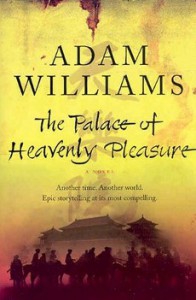
The Palace of Heavenly Pleasures
It was an adventurous, rewarding life but something was missing. “I remembered the plays I had written at school and that long buried ambition also to be a story teller. I began to write up my diaries of my desert excursions, attempting to publish a book on my camel expedition. That idea failed, but I had picked up a writing habit on weekends and public holidays and in 1997 I started my first novel, loosely based on my family heritage in China – which I finished in 2002.” In 2003 it was published by Hodder & Stoughton as ‘The Palace of Heavenly Pleasure’.
While continuing to live in Beijing working for Jardines, he now spends several months of the year in Italy where he bought a house for writing. Several more books followed. ‘The Palace of Heavenly Pleasure’, set in the Boxer Rebellion, became the first in a trilogy.
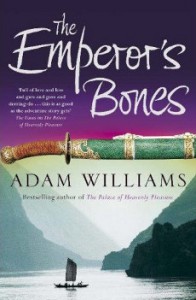
The Emperor’s Bones
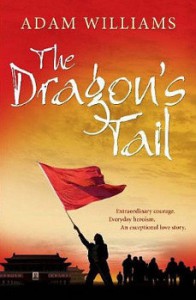
The Dragon’s Tail
It was followed in 2005 by an epic of China’s civil wars in the 1920’s, ‘The Emperor’s Bones’ which again drew on stories told him by his grandmother and mother about their life in North China between the Wars. In 2007 the last book in the trilogy ‘The Dragon’s Tail’ took the story into his own lifetime, covering the period in history leading from the Cold War, through the Cultural Revolution to the Tiananmen Incident that he witnessed from his balcony. The trilogy has been published in more than 15 languages around the world.
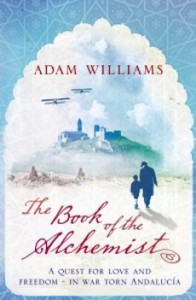
The Book of the Alchemist
Meanwhile his personal life has changed. The children from his first marriage had found careers – his daughter Clio is an Assistant Editor on the Sunday Times Magazine, his son Alexander is a tank squadron commander in the Army and has had a posting in Afghanistan. In 2009 Adam and Fumei divorced and he married the well known Chinese author, Hong Ying. “I thought in my fondness that life would throw no new surprises. But in Venice I met a Chinese writer, a feminist and a marvelous cook, and now we have a daughter. So a new adventure begins.”
Adam continues his life of part business, part writing. In 2009 Hodder published his novel set in the Spanish Civil War called ‘The Book of the Alchemist’ . He is now writing a detective novel set in the period of the First Crusade.
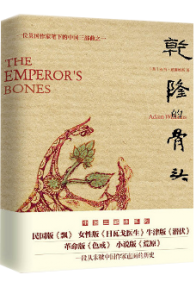
Qian Long’s Bones
And in May 2013 he achieved another ambition, when his first book was brought out in Chinese. The Chinese version of ‘The Emperor’s Bones’ (in Chinese ‘Qian Long’s Bones’) was published by Phoenix Publishing and Media Inc, part of the Jiangsu Literature and Art Publishing House . Within a few days of it coming out it achieved the No 1 Bestseller slot on Dang Dang Wang, China’s largest online book selling company, and there are plans for Adam’s other books also to be published in Chinese.
“China’s history has for more than a century been my family’s history,” said Adam, “and I am thrilled that now my novels, set against the background of that history can be brought alive to Chinese readers. It’s a sort of coming home.”
